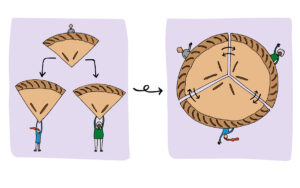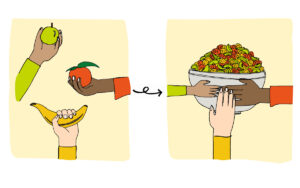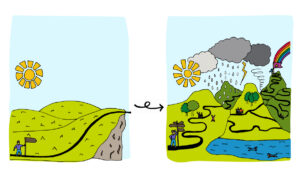In my TEDxNHS talk I shared my journey as a dietitian, working with people experiencing food insecurity. Despite my best efforts and intentions I often felt powerless to address the day-to-day challenges that people I was working with were experiencing. These tough lessons and experiences fundamentally changed my outlook and approach to tackling food insecurity. I now know that tackling food insecurity means putting people at the heart of redesigning our food system. It is about working towards a food system that is equitable and works for people, where the circumstances in which you were born don’t dictate the quality of your food experiences, where people have the power, voice and motivation to shape their local food environments and where people can access food with greater dignity, choice and autonomy. In this blog I explore four fundamental starting points to a more people-powered approach to rethinking our food system.
1: Challenge stigma and shift the narrative
Not only does stigma affect the care and support that people receive and have access to but it also affects our sense of justice, level of ambition and where we look for solutions when redesigning our food system. Stigma is rooted in the stories we tell ourselves; in this case about why some people show up at food banks and while others don’t. To me, the narrative is currently skewed – giving a lot more weight to individual choice and effort. A food system that works from people starts with acknowledging that food insecurity is not a result of people’s own making and isn’t a fact of life. It’s about acknowledging the drivers of food insecurity that exist because of a system that we, humans, have created and we, humans, can change. We must shift the narrative from consumers who can’t afford food to citizens who have the right to participate in shaping their food environments. We must replace top-down charitable interventions with bottom-up insights, solutions and ideas that are supported by top-down listening, power sharing and unblocking.
2: Find the common denominator for seemingly isolated problems

Food insecurity isn’t an isolated challenge of our food system: while 9% of UK households have experienced food insecurity in the past year, 14% of UK deaths are related to diet each year and 30% of global greenhouse gases come from producing our food. For decades, much of the thinking and resources that have been dedicated to address these issues have focused on each in isolation rather than together and have tackled the symptoms rather than the root causes. In redesigning our food system for the better, we must first redefine the problems we are trying to solve, acknowledge these complexities and interdependencies and consider common denominators, such as income inequality, that could be driving many of these issues. This will allow for a more efficient and holistic approach in tackling these issues and measuring progress. It also helps account for any unintended consequences (both positive and negative) that a change in one area of our food system may have in another.
3: Work with people who will disagree with you

Tackling complex problems on your own or with people who only agree with you is nearly impossible because you will only ever hold one small piece of a large jigsaw puzzle. Food choices are influenced by a wide range of factors – from early childhood food experiences to national and international policies and trading agreements. To account for this complexity when defining and tackling this issue, look into tapping into a wide range of expertise. Find people and organisations that hold a different piece of the puzzle and who will add a new perspective. It is especially important to include expert voices that have been traditionally excluded from these conversations – like frontline practitioners and people with lived experience. Create inclusive spaces for unique perspectives to surface and where diverse voices are heard and can ignite change for the better.
4: Take the messier road and fail well

The journey to tackle the complex challenges that our food system faces will be long and messy. There won’t be a neat start and finish, failures along the way are inevitable and measuring progress won’t be straightforward. And acknowledging this reality is key; it helps us remain grounded against the allure of the ‘silver bullet’ approach that oversimplifies the problem and presents seemingly promising solutions that, at best, would temporarily ease the symptoms. It also helps us make peace with not having the answers and encourages starting from a place of curiosity, making room for diverse voices to be heard and for new solutions to bloom. It allows us to ‘fail well’ by nurturing experimentation, using inevitable failures as feedback and creating regular spaces for people to come together, take stock and evolve the approach being taken accordingly.
There’s no denying that we’re in a pivotal moment in history that can be harnessed into positive change – in the past year people have experienced unprecedented levels of food insecurity and in response, unprecedented levels of awareness, energy and momentum has sparked in this space. Many communities and organisations found themselves quickly adapting to tackle food insecurity for the first time, finding solutions that were more collaborative and community-led than ever before. There’s much to learn from that. Now is the time to make sure that these difficult experiences weren’t in vain; to pause and take stock about what we’ve learned and use the wisdom that has been gained from these challenging experiences to design a food system that is powered by people and that is fit for the future.

